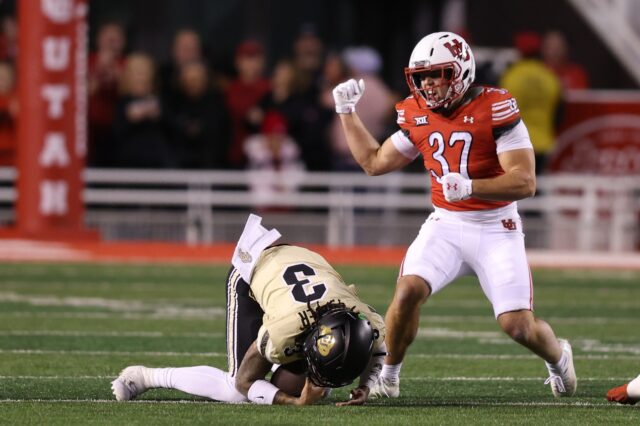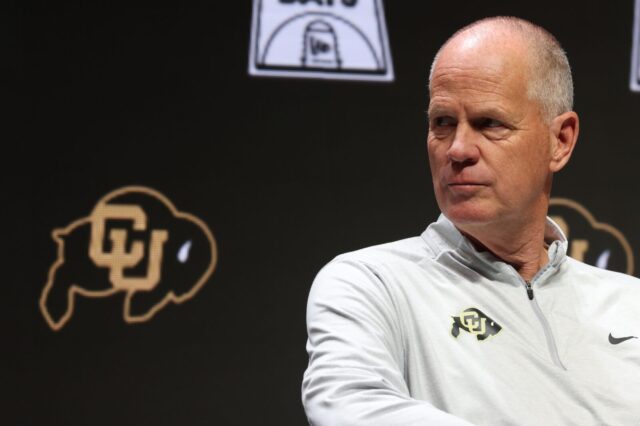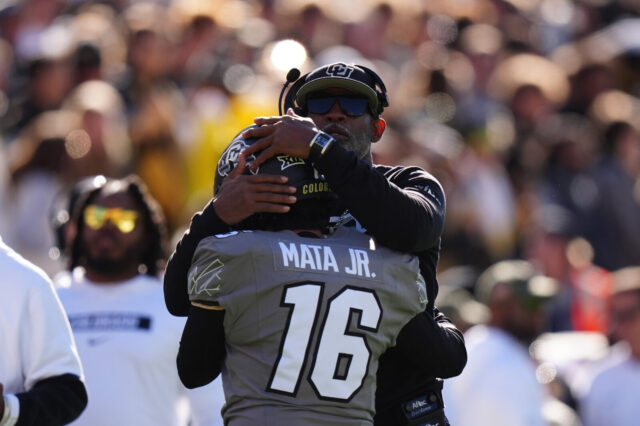The rumblings out of Fort Collins started moments after the press release came out. The University of Colorado and the Air Force Academy were finally, after more than four decades, going to renew their football rivalry, starting in 2020 in Boulder. In 2022, the Buffs will travel to Colorado Springs. To Colorado State fans, this meant, obviously, that the Buffs are going to be dodging CSU from that point on and the Rocky Mountain Showdown will become extinct.
Only that’s not the case.
It’s true that CSU and CU will likely not be on each other’s schedules for at least a couple of seasons in the early part of the next decade at least. (But even that’s actually yet to be determined. Things change all the time.) Yet even if they don’t play in 2021 or 2022, that doesn’t mean the in-state rivals won’t play each other ever again, and it certainly doesn’t mean CU is dodging CSU. It just means they’ve opted – rightfully – to add some variety to their scheduling. That’s not a bad thing. During the next decade, Colorado has already scheduled non-conference games against Michigan, Nebraska, Texas A&M, TCU and Minnesota.
In the meantime, CSU is working to beef up their non-conference slate as well. That actually begins this season when the Rams host the Big Ten’s Minnesota Golden Gophers the week before this year’s Rocky Mountain Showdown. Frankly, the Minnesota game will be more important to CSU’s national image than the CU game will be. If CSU is serious about continuing to upgrade their football program, and perhaps attract the attention of an expanding Power Five conference, then they need to continue to look outside the border for more big time non-conference matchups. Winning another game in the annual series with CU in September would be great for the Rams. Beating a Big Ten team – an outfit that has beaten Nebraska two years in a row and been to three straight bowl games (with an even dozen bowl appearances since 1999) would mean much more.
It’s okay if college football rivalries take a break. The University of Miami and the University of Florida remain bitter rivals and they’ve only played six times since 2001. In-state rivals Pittsburgh and Penn State haven’t played a football game since 2000. They’re now slated to meet every season from 2016-2019. CU and CSU can still be rivals, even if they skip a season or two.
Let’s look at the bigger picture: College football is second (or third, or fourth) banana in this state. If it’s true that a rising tide lifts all boats, then the best way to raise the profile of the sport in Colorado is for all three of the major college teams in the state to not just improve, but to interact. The CU vs. AFA games will bring a new excitement and new energy to the sport here. An uptick on the “fervor” meter would actually benefit CSU more than routinely playing the Buffs in a half-empty Sports Authority Field.
CSU supporters are eagerly awaiting the opening of their new stadium (scheduled for 2017) and many have begun openly (and prematurely) campaigning for membership in the Big 12 – even though the movement is pointless prior to the opening of the new stadium. No Power Five conference wants anything to do with Hughes Stadium. While the poor facility remains a drawback, the major black mark on CSU’s Big 12 resume is what one national article called “dismal” fan support. Doesn’t it stand to reason that if the game of college football became a bigger deal to all Colorado sports fans, that CSU would stand to benefit?
This is not to say that the Rocky Mountain Showdown isn’t worth saving, because it is. It just needs a new spark. Part of that will be provided by improvement in both CSU and CU’s programs. Another part will be moving the games back to campus sites when CSU’s new on-campus stadium is completed. A third part might be adding a third team – the Falcons – into the mix. It would actually be cool if the CU vs. Air Force game got its own catchy nickname.
Ironically, 2020 – the first year of the Buffs vs. Falcons – is also the final year of the current series contract between Colorado and Colorado State, so two of the Buffs’ three non-conference games that season will be against the Rams and Falcons. Since the latter two also play each other later in the year, we’ll have a good old-fashioned round robin “state championship” that season. It will be fun, but that doesn’t need to happen every year.
You can make the argument that CU shouldn’t be wasting time with games against UMass or New Hampshire or Texas State and SHOULD be playing Air Force and CSU regularly. (And CSU need not be playing Savannah State, either.) But if the Buffs had to play both CSU and AFA every season, wouldn’t that get a bit monotonous? The Buffs already have nine conference games every season. Now you’re expecting CU to make two of their three out-of-league games against the same two in-state rivals EVERY season? There’s no national attention to be garnered from doing that. And Air Force already has the obligation to have Army and Navy on the non-conference slate every season, so they don’t have much flexibility in non-conference scheduling, either.
The fact that Colorado and Colorado State aren’t scheduled to play after that 2020 game doesn’t mean they’ll never play again. It isn’t critical that the Rams and Buffs play every single season. Cries about “The end of the series” are an overstatement. It’s a break, that’s all. Since CSU and Air Force are in the same conference and meet every season, wouldn’t it be okay if the Buffs played both schools on just a semi-regular – say, every other year – basis? The Rams and Falcons play every year. Isn’t it okay for CU and Air Force to play in 2022 while CSU hosts, say a Kansas State or even (gasp) BYU? Wyoming has somehow lured Texas, Virginia and Nebraska to Laramie. Bring Jim McElwain and Florida back to Fort Collins. It can be done.
Let’s not forget that there are open dates remaining on CU’s schedule in 2023 and 2024. Wouldn’t it be fine if the Rams and Buffs missed each other in ’21 and ’22 and then got back after it?
If I was Pac 12 Commissioner Larry Scott, I’d make the bold move to stray from the strict conference scheduling rules in November and have Utah meet archrival BYU and CU face CSU on “rivalry weekend” at the end of every season, the same way Florida plays Florida State, Georgia meets Georgia Tech and Clemson faces South Carolina out of conference. The “Holy War” and our “Centennial Cup” battle would certainly create more fervor for college football than the always mundane Buffs vs. Utes non-rivalry season ender currently does.
That’s not going to happen any time soon, so we’re left to make the best of what we have. That should include a very solid Air Force program being worked regularly into the scheduling mix – for the good of the sport in Colorado.



